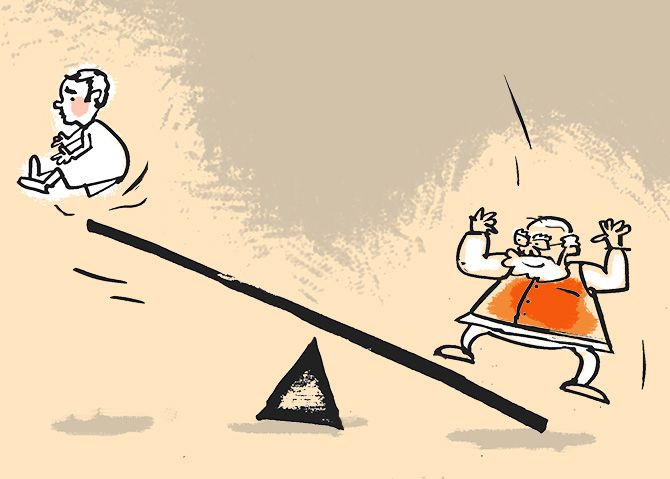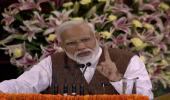'No, the liberals haven't lost because there weren't any liberals in the fray to begin with.'
'What has happened is that left-wing orthodoxy has lost to right-wing orthodoxy.'
'That is at best a Pyrrhic victory for India,' argue Sonali Ranade and Sheilja Sharma.
Illustration: Dominic Xavier/Rediff.com

'Liberals were wrong and have lost,' screams Twitter on my time line. I didn't know if any liberals were actually contesting the election that they have just lost.
A more subtle form of the above argument holds that the elections have proved that liberals no longer speak for the subaltern classes since the latter have overwhelmingly voted for Prime Minister Narendra Damodardas Modi who is a subaltern personified.
I didn't know liberals spoke for subalterns because as a liberal I speak only for myself.
Politicians speak for others, not liberals.
And I do believe it is right to speak of fairness in society, especially when the underprivileged are given the short shrift, and will continue to do so./p>
It doesn't mean I own the subalterns or that they even care for what I have to say. So why are the liberals the losers here? It is something worth exploring.
Populism is often set up as 'We vs Them where 'We' represents the masses that shower adulation on the populist leader. The 'Them' can be anything opposed to what populism is pushing at any particular point in time.
So if populism is pushing Hindu majoritarianism, then the other are minorities, or termites.
If populism is pushing nationalism, then the other are anti-nationals who love Muslims and/or Pakistan.
On the other hand, if populism is pushing right-wing orthodoxy, then the 'Them' are Communists, Urban Naxals or the 'tukde tukde gang'.
Populism by definition is very light on ideology because it aims to attract voters uncommitted to any particular party or ideology and must therefore be all things to all people. Perforce it picks on a vague thing like 'Making America Great Again' or 'Strong and Resurgent India' as a coverall for all sorts of things.
The trick lies in conflating the slogan with the populist leader through propaganda.
Now who in her right mind wouldn't want a 'Strong and Resurgent India'? But since the leader is identified with this notion, the moment you oppose the leader you are ipso facto against a strong and resurgent India.
On such cheap rhetorical trickery are people branded anti-nationals, Urban Naxals, 'tukde tukde' gang or whatever./p>
In this gaggle of emerging epithets, the liberal is a catchall category for the 'other'.
So what is a liberal?
The fact is, 'liberalism' has no meaning outside of context.
Who were the original liberals in history? Christians who argued that all souls were equal before God and hence all people should be equals here on earth as well with each being entitled to redemption according to deeds.
In time, the first liberal agenda was abolition of slavery and that helped to eliminate the scourge over the following decades starting with the Roman period.
Did the liberals of that era remain liberals after the Church was established, slavery tamped down, etc? No. Over time, liberals themselves turned orthodox, defending the Church's orthodoxy as vigorously as they had opposed slavery.
Modern liberalism surfaced with the founding of a number of universities in Italy circa 1500 that opposed the Church orthodoxy, but were Christian in faith nevertheless. Much like the Hindu liberals that Hindutva despises.
The liberal cause then was that truth could be discovered through the application of reason and that an individual, not the church or society, had primary agency.
The church, or the revealed truth, was not the basis of all that was known or knowable. Truth was something we had to discover through reason applied to facts and experience.
And that is what real liberalism is all about.
In short, a liberal is an individual who believes truth can, and must be, discovered by application of reason.
Now try and find somebody who is not a liberal today in this context.
The entire edifice of what we know today is owed to liberals starting with the Greeks of antiquity who recognised no Church other than reason and were rediscovered by Renaissance circa 1500.
To be liberal is to be political.
For the simple reason that application of reason is what creates new knowledge and new knowledge is what threatens the established order of things.
Reason will uncover new knowledge. In fact, that is the only way we know how to discover and create new knowledge. There is no other way.
And as new knowledge is discovered the priesthood of existing knowledge denies it.
The established order ridicules it, laughs at it, points to the inconsistencies it gives rise to, and quotes authority to hold that since the established order is proven over time, the new knowledge and the liberals who back it, are wrong.
This sequence is unchanging in time. But as we know, new knowledge gets applied tentatively at first, then with more confidence, and as people gain familiarity and confidence, new knowledge replaces the old.
Old authority is set aside and new authority created. Yesterday's liberals become the new conservatives and society then waits for the next new thing to emerge.
The enduring liberal then is one who not only believes that new knowledge must be discovered through reason, but also keeps in mind that, almost certainly, what is discovered today may well be set aside with new discoveries tomorrow.
I find it hard to believe how the world at large can fault a true liberal unless of course you are establishment and have something crucial to lose from the new ideas.
As I said before, the Greeks worshipped reason and were the first liberals in thought if not in deed. Plato's liberalism coexisted with a caste system and slavery, worshipped the Spartan totalitarian dystopia as an ideal and denounced his own democratic Athens as debauchery!
People of Plato's era would have seen him as a conservative who preached the ideal of Communism to elites and upper castes.
In contrast, we have Heraclitus who recommended we celebrate change as new knowledge is discovered and would have rubbished Plato's theory of the permanent ideal that decays over time because it assumes the perfect is already known and there is nothing new to discover.
That is an idea that runs through Hindu thought and philosophy as well. Moral of the story? To be a liberal is to welcome new knowledge and to be ready to apply it.
That unfortunately is neither simple nor easy. Being a liberal is tough while being a conformist is to go with received wisdom.
Bracketing a liberal with an ideology forever is futile and a negation of the very idea of liberalism.
So why are liberals pilloried all the time?
Why is a liberal always intensely political?
The reason is simple. All new knowledge will always be followed an argument in society about if it is wrong, right, its correct scope, application, changes need etc.
And there will be a liberal argument for it just as there will be conservative argument against it.
But more than just the validity of the new idea, there is the political. An example from the times of Pythagoras may help.
Back then, mathematics was revered much like religion because it was so useful and magical in constructing houses, buildings, bridges, monuments etc.
Temples were raised to the glory of perfect rational numbers. Until a mathematician named Hippasus arrived on the scene arguing that there could be no rational root of the natural number 2 and that there many such irrational numbers.
There was no way around Hippasus's argument, so what did his fellow mathematicians do? They took him out to sea for boating and drowned him rather than see their temples demolished!
And you thought the Hindutva lot was Luddites?
New knowledge is usually not as welcome as you might assume from a casual reading of history. As Michel Foucault famously said, every new idea creates its own priesthood. But before it can do so, it falls to the liberals to demolish the old.
Which is why we liberals are the permanent enemy of the old and the new establishment. And so rarely found except in the wild.
Liberalism without context is meaningless and must always be discussed in a frame of reference.
Liberals in a Communist society argued against Communism with as much vehemence as conservatives argued for orthodox totalitarian Communism.
Likewise, liberals in a capitalist society will argue against orthodox laissez faire as conservatives argue for it.
Liberalism is neither pro this dogma nor anti that.
A liberal is against the dogma of the left and the right, whether economic or social, because s/he wants to remain open to the possibility of change but also because dogma inhibits the agency of an individual to pursue new knowledge.
Note, a liberal is not always anti-establishment either.
If, for instance, you find a society where the individual is celebrated and individualism is encouraged, as in the US, then a liberal is very much pro-establishment.
Which is why you find liberalism more of a conservative virtue in the US rather than in the collectivism of the left.
Liberalism in India is much misunderstood term in politics.
Who is a true political liberal in India? Very few.
The leftists would almost never count among them. Neither would the Hindu right.
But a distinction needs to be made here between the personal and society at large.
At the personal level, I can hardly think of any educated person who would not be a liberal in the sense of choosing reason over dogma as the way to discover the truth. Most of us are liberals in that sense.
The political liberal, though, is hard to find
A liberal being one who wants maximum agency, economic and political freedom for an individual, is most unlikely to found in the left parties, Communists or Hindu right.
Ever since Independence India has lost its individuals. They don't exist. We see individuals only as a part of collective categories -- caste, class, religion, student, teacher, haves, have-nots, nationalist, anti-nationalists, male, female, termites, non-termites, whatever.
India has lost her individuals. And without individuals, there are no liberals. We have reduced liberalism itself to a permanent category of empty ritual.
In India, the idea of a liberal is still stuck at the level of an individual and has yet to be adopted as a norm for society as a whole.
As a society we are steeped in religiosity and conservatism/orthodoxy to the core.
So which liberal lost the election that the populists won so handsomely? The correct answer is, none.
India needs an army of liberals to break the chains of economic and political orthodoxies that constrain Indian enterprise and Indian ideas.
Our contribution to the world's store of new knowledge and new ideas over the last 500 years and more has been pathetic.
Revolutions have come and gone, bypassing us, while we remain stuck in orthodoxies of an irrelevant past, our economic and political prowess a fraction of what it needs to be.
Remember, an entrepreneur is a liberal first, an entrepreneur second.
And our orthodoxies set up such perverse incentives for entrepreneurs and liberals that we revere those who kill them.
No, the liberals haven't lost because there weren't any liberals in the fray to begin with.
What has happened is that left-wing orthodoxy has lost to right-wing orthodoxy. That is at best a Pyrrhic victory for India.
India will win only when liberals and entrepreneurs win and that won't happen under any orthodoxy, left or right.










